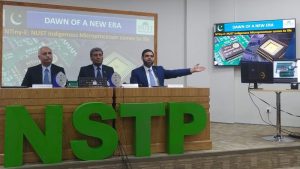In a laudable development, researchers at the National University of Sciences and Technology (NUST) have successfully completed full functional testing “NTiny-E”, the country’s first truly indigenously designed microprocessor.
This was revealed by the Pro-Rector (Research, Innovation and Commercialization) NUST Dr Rizwan Riaz during a press conference on Monday. He was accompanied by Principal SEECS Dr. Ajmal Khan and NTiny design and development team leader Dr. Rehan Ahmed.
This is a remarkable accomplishment because as a country, Pakistan has so far failed to truly capitalize on the ever-present need for semiconductor technology across the world. Global semiconductor sales amounted to $595 billion in 2021, and the ability to indigenously design microprocessors could be the first step toward having a slice of that pie.
Speaking on the occasion, Dr. Rizwan Riaz highlighted that the embedded microprocessor chip was designed by the research team of the NUST School of Electrical Engineering and Computer Science (SEECS).
He said that semiconductor chips are at the heart of all electronic devices and consumer appliances that we use every day.
The unique aspect of the project is its completely in-house design as opposed to common practice of using open-source cores from other sources or via foreign collaborations. This makes NTiny-E a truly indigenous product that provides the design team complete leverage and control over all aspects of the chip.
NUST selected the world’s largest and leading commercial foundry, Taiwan Semiconductor Manufacturing Company Ltd. (TSMC) for chip fabrication, utilizing the industry-standard 65 nm process node.
This demonstrates researchers’ ability to design chips that are compliant with international industrial design and fabrication standards.
Dr Rizwan Riaz pointed out that the NUST team has not limited itself to the design of the chip itself but also developed a complete ecosystem required for chip testing and its incorporation into end products. The printed circuit board for chip testing and prototyping of end systems has also been indigenously developed along with associated software and development tools.
This development will allow researchers and industrial product developers to design and manufacture products based on NTiny-E. Some interesting applications of this technology include embedded systems, IoT devices and consumer electronic products.
Moreover, the indigenous nature of the product mitigates concerns related to cyber security and technology denial.
NUST is also developing competent and market-ready human resource for the semiconductor market to address critical shortages through its undergraduate and post-graduate programs.
It is worth noting that in the current context of global shortage of semiconductor chips, the ability to design such technology in-house can not be understated. NTiny-E is an important step towards that kind of technological self-reliance.






 Internet Explorer will officially ‘retire’ tomorrow after 27 years
Internet Explorer will officially ‘retire’ tomorrow after 27 years